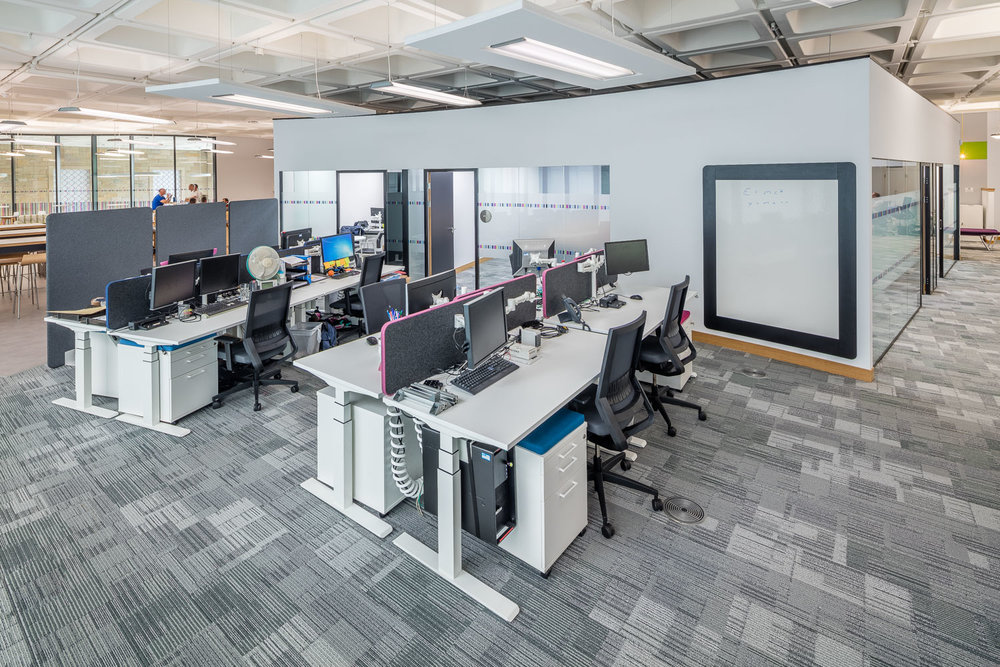Good office space management is essential for productivity and success. But with so many factors to consider, it can be overwhelming to know where to start. That’s where this guide comes in.
We’ll take you through the ins and outs of office space management, covering everything from layout and design to organization and team collaboration. By the end of this guide, you’ll have all the tools you need to create a functional and cohesive office space that maximises productivity and promotes a positive work culture.
What is Office Space Management?
Office space management is the process of organizing and optimizing the use of office space within a business. This can involve a variety of activities, such as designing the layout of the office to increase efficiency and productivity, implementing systems for reserving and scheduling conference rooms and other shared spaces, and managing the allocation of desks and other workspaces to employees.
It can also involve coordinating the procurement of office furniture and equipment, and ensuring that the office environment is safe, comfortable, and conducive to work. The goal of office space management is to make the most effective use of the available space, while also creating a pleasant and functional work environment for employees.
The Different Aspects Of Office Space Management
- One important aspect of office space management is designing the layout of the space. This can involve determining the most efficient placement of desks, workstations, and other furniture, as well as identifying the best location for shared spaces like conference rooms and break rooms.
- Another key aspect of office space management is managing the allocation of space to employees. This can involve assigning individual desks or workstations to employees, or implementing a “hoteling” system in which employees can reserve workspace on an as-needed basis.
- In addition to managing the physical layout and allocation of office space, office space managers may also be responsible for coordinating the procurement of office furniture and equipment. This can involve working with vendors to select and purchase new furniture and equipment, as well as managing the maintenance and repair of existing items.
- Finally, office space managers may also be responsible for ensuring that the office environment is safe, comfortable, and conducive to work. This can involve managing lighting, temperature, and air quality, as well as implementing policies and procedures to prevent accidents and injuries.
Factors That Affect Your Office Space Management

Several factors can impact effective office space management including the size and layout of the space, the number of employees, the type of work being done, and budget constraints. Below are some of these factors.
The location of your office space
The location of your office space is an important factor to consider. It should be convenient and accessible for you and your employees, and it should also be in an area suitable for your business. You may want to consider factors such as proximity to public transportation, the availability of parking, and the local business climate.
The size of your office space
The size of your office space will depend on the number of employees you have and the type of work you do. Make sure you have enough space for all of your employees to work comfortably, as well as space for common areas such as a kitchen or break room.
The layout of your office space
The layout of your office space can have a big impact on productivity and employee satisfaction. Consider the placement of desks, workstations, and common areas, and try to create a layout that promotes collaboration and communication.
Your office furniture and aesthetics
Choose furniture that is comfortable and functional, and that is suitable for the needs of your business. Make sure you have enough seating for all of your employees and consider adding ergonomic features to help reduce the risk of injury. Add personal touches to your office space with decorations and artwork that reflect your company’s culture and values. This can help create a positive and welcoming environment for your employees.
Your office technology
Determine the technology and equipment you need to run your business, including computers, printers, and internet access. You may also want to consider purchasing other equipment such as projectors or video conferencing systems.
Your office storage
Make sure you have enough storage space for supplies, documents, and other materials. This can help keep your office organized and efficient.
The Complete Guide To Office Space Management

Here’s a complete guide for managing your office space effectively:
Identify your needs
Before you start organizing your office space, it’s important to consider the type of work that is done in the space and the needs of your employees. This will help you determine what type of layout and furniture you need to create a functional and efficient workspace.
Utilize storage solutions
Proper storage is essential for keeping an office space organized and clutter-free. Consider using storage solutions like filing cabinets, shelving units, and storage bins to keep your office organized.
Create a floor plan
A floor plan can help you make the most of your office space by outlining the layout and placement of furniture and equipment. This can help you ensure that your office is set up in a way that is efficient and promotes productivity.
Make use of vertical space
Don’t forget to utilize vertical space in your office by using wall-mounted shelving and bulletin boards. This can help you save space and keep your office organized.
Set up a system for managing supplies
Establish a system for managing office supplies, such as keeping a centralized supply closet or assigning someone to be responsible for restocking items. This can help you avoid running out of essential supplies and reduce clutter in the office.
The Benefits Of Good Office Space Management To Your Business

Effective office space management can have several benefits, both for your business at large and for your employees. Some of the potential benefits include:
Increased productivity
When employees have a clean, well-organized, and comfortable workspace, they will be more productive and efficient because they will have an easier time finding the tools and resources they need to do their job, and they will be able to work in an environment that is free of distractions and clutter.
Improved morale
A pleasant and well-managed office space can contribute to a positive work culture and improve employee morale because it shows that your company values its employees and is willing to invest in creating a good work environment. This can help to foster a sense of pride and ownership among employees, which can in turn lead to increased motivation and productivity.
Reduced costs
By using office space efficiently, your business can reduce its real estate costs and save money because it will be able to fit more people and resources into a smaller space, or it may be able to downsize to a smaller office space altogether. This can also lead to reduced energy and maintenance costs.
Enhanced communication and collaboration
A well-designed office space can facilitate communication and collaboration among employees because it can be designed to encourage interaction and teamwork. This could include features such as open floor plans, shared work areas, and breakout rooms for meetings and collaboration.
Improved image
A professional and well-managed office space can make a good impression on clients and other visitors because it shows that your company takes pride in its appearance and is committed to presenting a polished and professional image. This can help to enhance your company’s reputation and build trust with clients and partners.
Enhanced safety
Proper office space management can help ensure the safety and well-being of employees by identifying and addressing potential hazards. This could include things like maintaining a clean and organized workspace to reduce the risk of accidents, identifying and addressing potential fire hazards, and ensuring that the office is accessible to employees with disabilities.
Greater flexibility
An effectively managed office space can be more adaptable to the changing needs of the business because it can be easily reconfigured or rearranged to accommodate changes in staffing or workflow. This can help your business to be more agile and responsive to changes in the market or business environment.
Office Space Management Tools
There are many tools available to help businesses manage their office space and facilities. These tools can be classified into several categories, including:
- Space planning and design tools: These tools help businesses to plan and design their office space, including layout, furniture, and equipment placement. Some examples include AutoCAD, SketchUp, and Sweet Home 3D.
- Asset management tools: These tools help businesses to track and manage their physical assets, such as furniture, equipment, and supplies. Some examples include Asset Panda and Maintenance Connection.
- Workplace management tools: These tools help businesses to manage the day-to-day operations of their office, including things like meeting scheduling, task assignment, and facility maintenance. Some examples include Asana, Trello, and Wunderlist.
- Real estate management tools: These tools help businesses to manage their real estate portfolio, including lease management, property maintenance, and rent collection. Some examples include Yardi and AppFolio.
- Energy management tools: These tools help businesses to monitor and optimize their energy usage, which can lead to cost savings and a more sustainable office environment. Some examples include EnergyCAP and BuildingOS.
Extra Tips For Office Space Management

Here are a few additional tips for effective office space management:
- Involve employees in the planning process: When designing or reorganizing your office space, consider asking for input from your employees. They may have ideas or suggestions that can help to make the space more functional and efficient.
- Make use of vertical space: Don’t forget to consider the vertical dimension when organizing your office. Utilizing shelves, bins, and other storage options that are mounted on the wall can help to save floor space and keep the office organized.
- Use technology to your advantage: There are many tools and technologies available that can help you to manage your office space more efficiently. For example, you could use sensors to track the occupancy of conference rooms and adjust the lighting and temperature accordingly, or you could use a digital signage system to communicate important information to employees.
- Consider ergonomics: Make sure that your office is set up in a way that promotes good ergonomics for your employees. This includes things like proper seating and desk height, as well as the placement of computer monitors and other equipment.
- Keep it clean: A clean and well-maintained office can help to improve the overall atmosphere and productivity of the workplace. Consider implementing regular cleaning schedules and procedures to ensure that the office stays tidy and organized.
- Set up dedicated areas for common tasks: Consider setting up dedicated areas or stations in your office for tasks that are commonly performed, such as printing, copying, or scanning. This can help to reduce clutter and improve efficiency.
- Use colour to your advantage: The use of colour can have a big impact on the atmosphere and productivity of an office. Consider using different colours to identify different areas or zones within the office, or to create visual interest and inspire creativity.
Conclusion
In the article, we’ve covered various topics in office space management including factors to consider and extra tips to make your business successful. Ultimately, the goal of office space management is to help your business create a functional and efficient workspace that supports the needs of its employees.
Frequently asked questions
Does churchgate sell Office space?
Yes, Churchgate Group is a true partner to Nigeria’s businesses, dedicated to driving productivity and economic growth through our exceptional office spaces. With locations across the country, we are a one-stop shop for all your office rental needs.
Our commitment to excellence has made us a trusted choice for companies looking to thrive in Nigeria’s vibrant economy. From sleek, modern buildings to charming, traditional offices, we have the perfect space to match your unique business style.
When you choose Churchgate Group, you can trust that you are investing in your company’s success. Let us help you reach new heights of productivity and profitability.
Do you offer office space management services?
At Churchgate, we understand that managing an office space can be a daunting task, which is why we offer professional office space management services to our tenants.
Once you rent one of our beautiful and functional offices, you can sit back and relax knowing that our team has got you covered.
We take care of everything from maintenance and repairs to cleaning and organizing, so you can focus on running your business. With our top-notch office space management, you can enjoy all the benefits of a professional workspace without any of the hassles. Choose Churchgate for a stress-free office experience that allows you to do what you do best.
How do I rent an office space for my business?
If you’re searching for the perfect office space in Lagos or Abuja, look no further than Churchgate! Our team is dedicated to helping you find the ideal rental space for your business. From modern high-rise buildings to charming historical offices, we have a variety of options to suit your needs.
Take a tour with us and let us guide you towards your dream office. In no time, you’ll be up and running in a space that perfectly reflects your business and its unique needs. Don’t settle for a subpar workspace – choose Churchgate and start building your success today.





